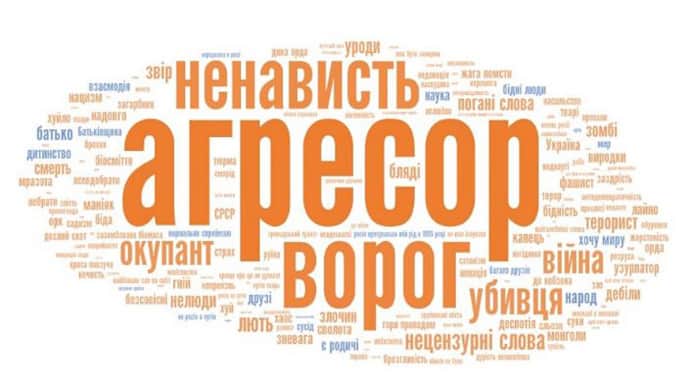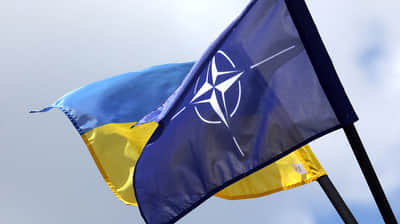Ukrainians associate "ordinary Russians" with enemies, non-humans and zombies – poll

80% of Ukrainians say that only negative words and phrases come to mind when they hear the phrase "ordinary Russians", while the word "Russia" itself evokes negative associations for 94% of the respondents in a new survey.
Source: the results of a poll conducted by the Kyiv International Institute of Sociology (KIIS) on 17-23 February and 16-22 May
Quote: "Statements about 'Russia' are negative or critical in 94% of cases and neutral or positive in only 5% of cases (1% said they were not sure). Regarding 'ordinary Russians' the situation is only slightly better – the words and phrases are negative in 80% of cases, and neutral or positive in 6% (14% said they had no associations or were not sure)."
Details: The sociologists asked respondents to tell them the first two or three words that come to their minds when they hear the word "Russia" or the phrase "ordinary Russians".
"Russia" evokes the following associations for Ukrainians: "aggressor", "enemy", "hatred", "occupier", "murderer", "war", "obscene words", "non-humans" and "rage".
Many Ukrainians respond to the phrase "ordinary Russians" with obscene language, as well as the words "non-humans", "zombies", "uneducated", "enemies", "stupid" and "ordinary people".

The sociologists emphasised that although slightly more people in Ukraine's south and east give neutral, positive or undecided answers, even in this region 75% of the words and statements are negative or critical (compared to 83% in the west and centre).

Note from KIIS:
1,052 respondents living in all regions of Ukraine (Ukrainian government-controlled territory) were interviewed during 17-23 February and 1,067 respondents during 16-22 May using the method of computer-assisted telephone interviews (CATI) based on a random sample of mobile phone numbers (with random generation of phone numbers and subsequent statistical weighting). The survey was conducted with adult citizens of Ukraine (aged 18 and up) who at the time of the survey lived on territory of Ukraine controlled by the government of Ukraine.
The sample did not include people living in territories that are temporarily not controlled by the authorities of Ukraine (although about 2% of each sample are Ukrainians who moved from the occupied territories) or Ukrainian citizens who moved abroad after 24 February 2022.
Formally, under normal circumstances, the statistical error of such a sample (with a probability of 0.95 and taking into account the design effect of 1.3) did not exceed 4.1% for indicators close to 50%, 3.5% for indicators close to 25%, 2.5% for indicators close to 10%, and 1.8% for indicators close to 5%.
In wartime conditions, in addition to the formal margin of error specified, a certain systematic deviation is added. The factors that can affect the quality of results in wartime conditions have been previously cited by KIIS. Overall, the sociologists believe that the results are still highly representative and enable a fairly reliable analysis of the public mood to be conducted.
Support UP or become our patron!





